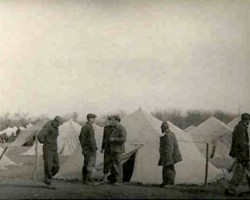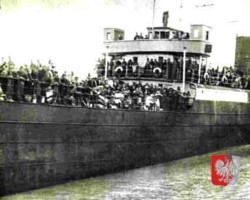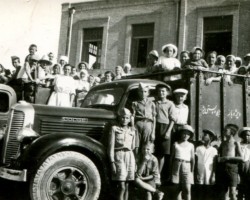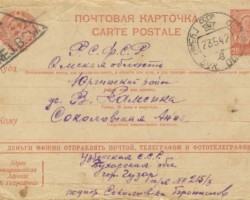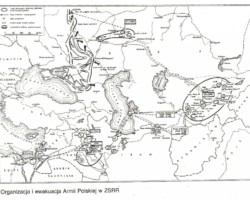Evacuation of Anders Army from the Soviet Union in 1942, and the geopolitical situation in the Middle East at that time
Prof. Dr. Hab. Zbigniew Wawer
On April 3, 1941, a coup took place in Iraq – the pro-British government of Prime Minister Nuri al-Said was overthrown, and power was taken over by Rashid Ali el-Gailani representing the “Homeland Brotherhood” party – a national-Arab movement supported by senior military commanders. This situation was part of the German plan to remove the British from the Middle East. At the same time, it expressed the aspirations of a large part of Iraqi society, hostile to the British presence in the country, which had lasted for over twenty years. After Iraq, the Axis powers planned to start rebellions in Iran and Egypt. Iraq was an important strategic goal for the Germans. The expulsion of the British units stationed there – according to the alliance agreement of 1930, the British had two military bases there in Habbaniyya and Shaibah, which guarded the oil pipelines running from Mosul – cut off the fuel supply to the British air force and the navy stationed in the Mediterranean. Fearing the consequences of a coup, on April 18, British and Indian troops, commanded by General Fraser, landed in Iraq.
On May 2nd, Iraqi troops openly opposed the British. At the same time, Prime Minister Gailani appealed to Germany for help. Hitler eagerly accepted this appeal. However, due to the fighting in Greece, he could not provide significant military aid in the first phase of anti-British demonstrations in Iraq. Instead, he instructed German diplomacy to obtain the consent of the Vichy government to use Syria as a base for the German air force and to allow arms shipments through that country to Iraq. The German air force took part in the fighting against the British in Iraq, but due to the inadequacy of the aircraft to the desert conditions, it suffered significant losses. Commandos from the Brandenburg Division were also in Iraq, tasked with destroying pipelines and diversion behind British troops. After a month of fighting, British troops took control of the situation and forced the Iraqi army to capitulate. An armistice was signed on May 31st. Most of the politicians and military who supported Prime Minister Gailani took refuge in Persia and Syria. From that moment on, the regent loyal to British policies returned to the throne, and power was taken over by people dependent on the British.
On June 8, in order to secure their interests in the Middle East, British forces attacked Syria and Lebanon, which were under the rule of the Vichy French government. After heavy fighting, the French forces were forced to surrender.
With the outbreak of the German-Soviet war and the rapid advance of German armies deep into the USSR, Prime Minister Churchill began to fear for his western wing in the Middle East, as he was aware that Hitler would want to capture the Caucasus at all costs in order to attack the oil fields in Persia (Iran) and Iraq from there.
In August 1941, fearing a German-inspired uprising in Persia, the country was occupied by British and Soviet forces. However, there was still fear of anti-British rebellion as German armies advanced towards the Caucasus and sabotage was carried out to destroy oil pipelines running towards the Persian Gulf.
In the summer of 1942, the German armies on the southern front in the USSR were on the offensive. Heading towards the Caucasus, they threatened the oil fields not only in the Soviet Union, but also in Persia and Iraq. If German troops crossed the Caucasus and took over its southern foothills near Tabriz, they would have gained a convenient area for establishing airfields from which it was possible to bomb the oil fields in Iran and Iraq, as well as British military bases in Habbaniya and the Persian Gulf.
In the Middle East operational area, not only was there fear of a German attack in the north, but also of an offensive on the North African front, where the situation had turned in favor of the Afrika Korps. The British command also feared the (unlikely) passage of German units through Turkey.
Due to the threat of fighting on two fronts, British Prime Minister Winston Churchill decided to reorganise command in the Middle East.
June 7, 1942 by Gen. Anders, dispatch No. 701 to the Commander-in-Chief. In the dispatch, the army commander wrote, among other things: “Our military situation here is approaching a catastrophe. We no longer receive some products almost completely, such as fats and vegetables, others in negligible quantities. The soldiers are starving, I already have a dozen or so percent of night blindness. There is no hope for improvement, on the contrary, the situation is constantly deteriorating. […] As a result of the above, the morale of the army is maintained only by the hope of leaving the USSR and great national discipline. Communication from the point of view of importing goods from Persia is extremely difficult and increasingly difficult. Training conditions are non-existent. Lack of gasoline, tires, means of transport and spare parts.
The encroachment on our internal life is growing. I am convinced that only at the same time as the decision to leave the army will further recruitment be possible.”
On June 11, in response to dispatch No. 701, the Commander-in-Chief was against the evacuation of the Polish Army from the USSR, believing that for the good of the cause, it should fight on the Eastern Front after obtaining full armament and training. Unlike General Anders, the Commander-in-Chief did not see Stalin’s double game, for whom only an army subordinated to and directed by the Soviet authorities could be useful. After familiarizing himself with the content of this dispatch, the commander of the Polish Army in the USSR did not refer to the issue of the evacuation of Polish units to Persia in official talks with representatives of the Red Army, and thus the matter of the evacuation was suspended. At the same time, however, British-Soviet talks were underway on the evacuation of Polish divisions to Persia. In June 1942, the German offensive was advancing victoriously towards Stalingrad and the Caucasus. The British, fearing a German offensive through the Caucasus towards the oil fields in Persia and Iraq, and mindful of German advances in North Africa, approached the Soviets with a proposal to allow the evacuation of the Polish Army from the USSR to Persia (Iran) and then to Iraq.
The British side believed that in the current situation the Polish divisions in Russia would not be armed, and that evacuation would create such opportunities. In talks they emphasized that thanks to this they would be able to reinforce the British 8th Army with units located in Iraq. The outcome of the negotiations was favorable for the Polish cause. At the end of June 1942, Commissioner Molotov passed on to the British ambassador in Moscow information that the Soviet authorities had accepted Prime Minister Churchill’s demands to transfer the Polish Army units located in the USSR to the British. In one of the telegrams sent in July to Stalin, Prime Minister Churchill wrote, among other things: “I am certain that it is in our common interest that the three Polish divisions that you have graciously offered should join their compatriots in Palestine, where we have the opportunity to fully arm them.” As part of the decision for Operation Torch, the British leader predicted that once the Battle of Egypt was won, four Polish divisions (three evacuated from the Soviets) together with eight British divisions would be able to play a significant role in delaying the German offensive from Russian territory to the south.
On July 2, the British Foreign Office informed Minister Raczyński that it had received a statement from Molotov from Stalin (which referred to the conversation between Churchill and Molotov about the transfer of the Polish Army to the Middle East) expressing preliminary consent to the evacuation of three Polish divisions from the USSR to Persia (Iran).
Four days later, the Commander-in-Chief informed General Anders of the decision to evacuate. Further talks on the evacuation took place through the British government.
On July 21, General Anders wrote to the Commander-in-Chief: “no news about the evacuation. The Soviet authorities are postponing all my proposals until the negotiations between the Soviet and British governments are completed. Our situation is becoming increasingly difficult. The Soviet authorities are arresting a number of soldiers for alleged crimes against the Soviet government and public order. […] In recent days, they have been making constant claims about anti-Soviet sentiments in the army. Anti-British agitation conducted in the army by the hosts has been established. I feel that this entire action is planned and is aimed at a clear provocation.”
On July 26, the army command in Jangi-Jul received a letter signed by NKVD Major Zhukov, in which we read: “The USSR government agrees to satisfy the efforts of the commander of the Polish Army in the USSR, Major General Anders, to evacuate Polish troops from the USSR to the Middle East and has no intention of placing any obstacles in the immediate implementation of the evacuation.”
On July 31, during a Polish-Soviet conference in Tehran, the principles of evacuation of Polish Army units and civilians from the USSR to Persia (Iran) were established. On the same day, Major NKVD Zhukov handed General Anders a transport plan for 70,000 soldiers and civilians evacuated from the USSR to Persia via Krasnovodsk. The first rail transport was to depart on August 5 and the last on August 22. The arrival of sea transports to Pahlavi was set for the period from August 8 to 26, 1942.
On August 1, 1942, General Anders issued an order to transfer the Polish Armed Forces to the Middle East. The order provided organizational regulations for the evacuation of the military and civilians. It also specified the principles for liquidating garrisons and leaving seriously ill soldiers on the territory of the USSR until they recovered.
Between 5 and 25 August, 44,832 soldiers and 25,457 civilians were evacuated to Iran. Only military offices and patients unfit for transport remained on the territory of the USSR, but they too soon left this inhospitable country. In total, 116,543 people were transported to Persia in two evacuations in March and August 1942, including 78,631 soldiers. It is worth noting that several hundred soldiers and about two thousand civilians, including over a thousand children, were also evacuated to Persia by land via Ashgabat. This evacuation was not completed until early 1943.
Exhibition Materials
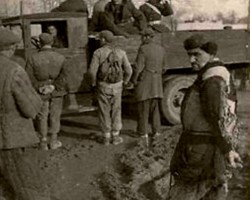
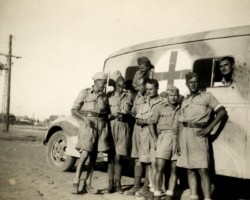

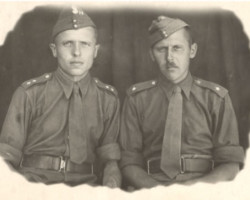

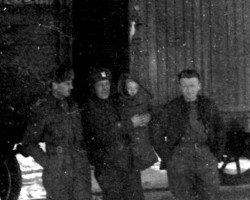
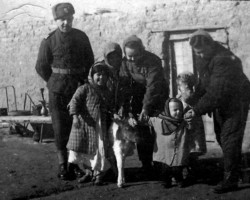
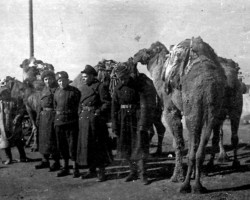


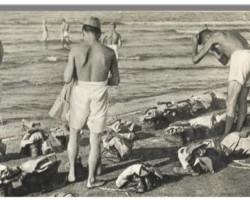
Photos
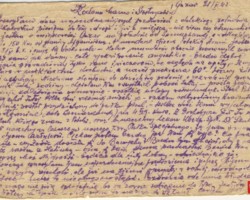
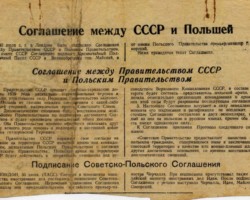
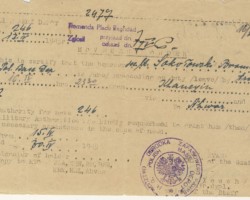


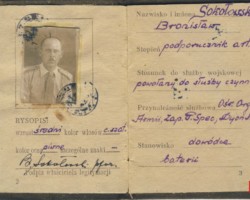
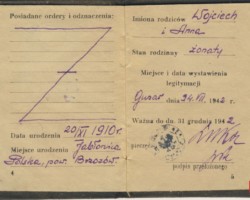
Documents
